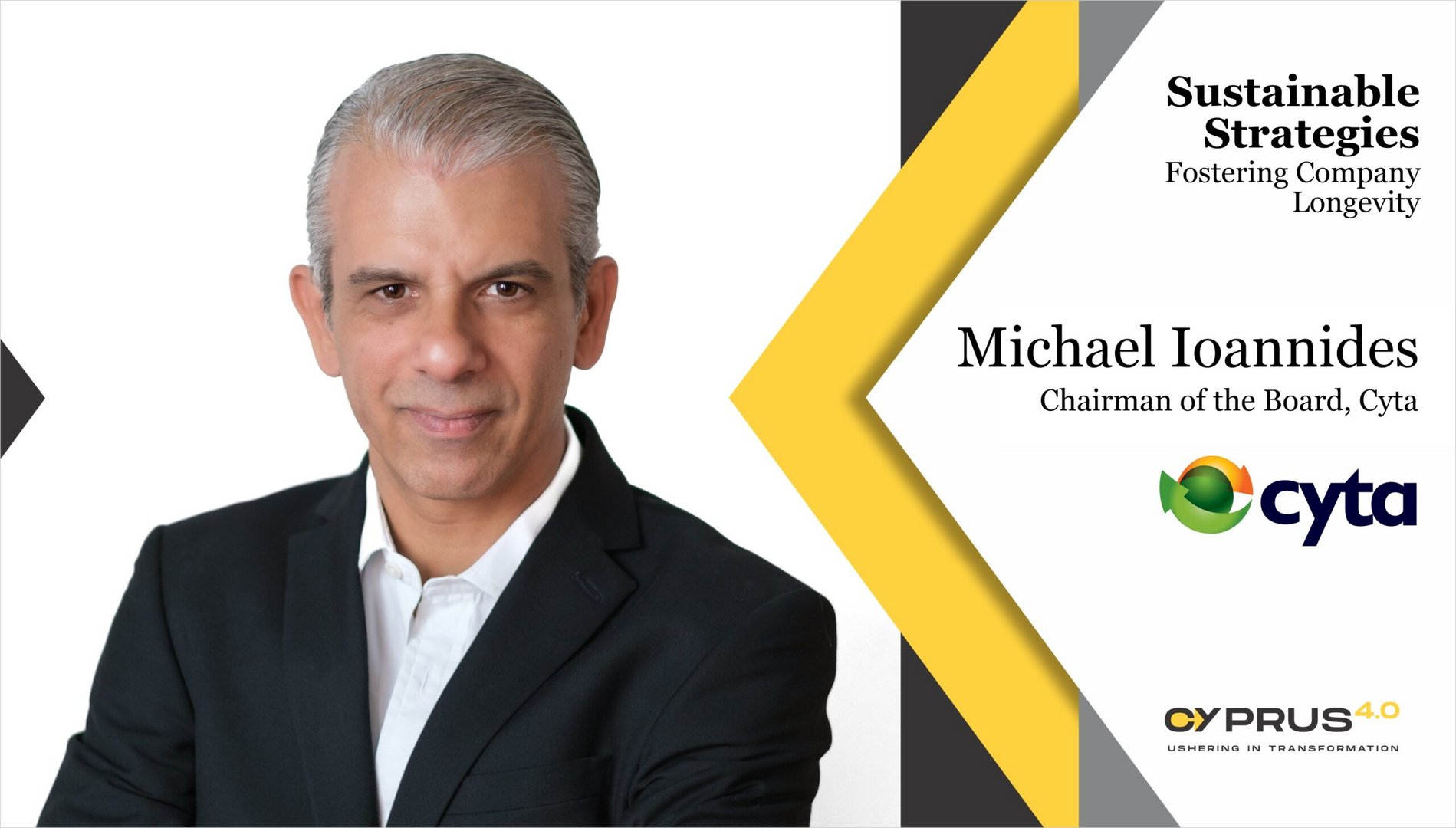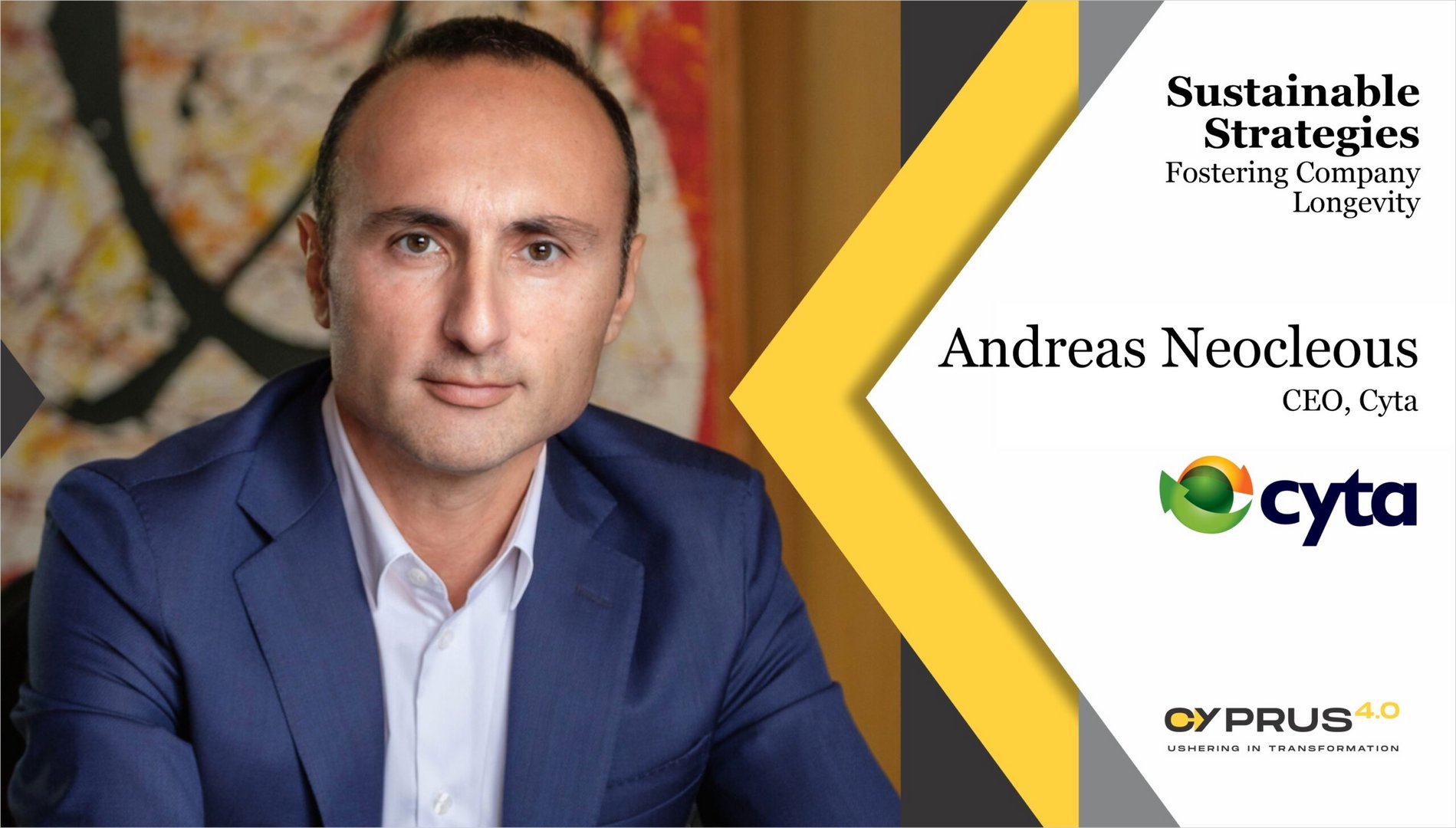‘The principles of sustainability are not new to Cyta; they make part of its DNA. Mindful of the need to protect the environment from the emissions of its business operation, Cyta has been running an Environmental Policy since 2001’
The problems caused by a reckless growth of industries and businesses are accumulating, leading us with mathematical precision to a new global crisis, the climate crisis. The UN, acknowledging the gravity of the problem, has laid down a set of specific guidelines and timeframes whereby states are called upon to adjust to the new conditions and adopt policies of viability and sustainability by 2030. The European Union, in its turn, has incorporated the UN goals within its European Green Deal, while adding a new ambitious plan of its own, namely reduction of the carbon footprint of the ICT sector by 100 per cent by 2050.
This means that, from now on, it will take much more than branding yourself as “green.” The creation of an integrated Strategy of Sustainable Development is an indispensable requirement that calls for substantial preparation and groundwork on behalf of all productive bodies and businesses in each country. It requires changes in the domestic culture, in structures, in the operations and processes of businesses, which will progressively impact on the very evaluation of their associates and suppliers’ networks to achieve alignment with the values and business ethics of each separate organisation.
Achievement of goals is interlinked with the digital transition of public administration in parallel with the automatisation of businesses, including traditional sectors of the economy such as agriculture. The use of digital tools for measuring and assessing the consequences of each plan and action becomes exponentially necessary for businesses seeking to conform with the many regulations and rules entailed in the goals, as well as for carrying on data collection and measurements (KPIs) intended to be published in Conformity Reports. It is also necessary for the best possible targetting of business actions and commitments, measuring results and being able to show documented progress to all stakeholders.

“Cyta is an organisation that disposes its reserves in capital, people and know-how in order to lead our society to the new age. This is what we are aiming for. A digital, green and a sustainable future, with a profitable Cyta that creates infrastructure for all citizens. One where the purpose of entrepreneurship is people, the focus of our operations is the customer, and our concern is the preservation of resources for the next generation.” Michael Ioannides, Chairman of the Board Cyta
Technological foundations for the country’s sustainable development
For 61 years now, Cyta has been leading the country’s technological evolution, with networks, funds, knowhow, and entrepreneurial competence. As we speak, owing to Cyta’s technological infrastructure, Cyprus can boast the quickest mobile telephony network in the EU, ranking 8th globally in mobile telephony speeds. Cyprus features above the EU average in terms of mobile broadband communications penetration and, based on DESI, the Digital Economy and Society Index for 2021, it has improved its coverage with very high-capacity networks (VHCN). Cyprus is soon expected to be the first European country to have 100 per cent population coverage with 5G networks, much earlier than prescribed by the European recommendations for full coverage by 2030. This creates significant comparative advantages for the country, contributes to the development and competitiveness of the economy, attracts new substantial investments, and creates the conditions for a new model of sustainable development.
The new technologies developed by Cyta, including the National Fiber optic network, the Pancyprian 5G network, even digital services stemming from these technologies (e.g. smart cities), are the cornerstone of the digital age infrastructure and make part of the solution to the climate crisis problem. The flexibility of new technologies as compared to older ones will first and foremost bring out applications that reduce the use of raw materials and foster productivity, more efficient operations (e.g., precision farming), products and services meeting the needs of new markets and customers, as well as increased occupational safety in hazardous professions, soon expected to rely on remote controls.
Aside the infrastructures at its disposal, Cyta’s sheer size, impact and penetration in the Cypriot society are such that internal changes can spread outside the organisation. Through its own transformation, Cyta can prompt its customers to the digital age, whether it be a business working with Cyta or a domestic user of its products and services.
‘Green’ is in our DNA
The principles of sustainability are not new to Cyta; they make part of its DNA. Mindful of the need to protect the environment from the emissions of its business operation, Cyta has been running an Environmental Policy since 2001. This policy has been drawn up within the context of Cyta’s Social Responsibility engagement. Our efforts to reduce the consumption of electric power include the use of more energy-efficient equipment and keeping paper use to a minimum. Since 2017, we have maintained the ‘Green Offices’ certification programme for all Cyta shops and since 2019 for all our manned buildings across Cyprus. Since 2016, we are also the first organisation in Cyprus with Zero Waste to Landfill: for 2020, our waste recycling/reuse rate has reached 97,55 per cent, as certified by an independent inspection body (TUV Austria). Being the first strategic partner of the “We make Cyprus green” initiative, we are committed to planting a tree for every ten new Cytavision connections, aiming to reduce Cyta’s carbon “footprint.”
Additionally, as the first strategic partner of the Cyprus Forest Association, we have acted toward the upgrade and protection of biodiversity on the island. Since 2010, we have been running a recycling programme for mobile and landlines phones and other terminal equipment, aiming mainly to protect the environment and encourage the public to further engage in recycling. Cyta has been repeatedly awarded the “Gold Protector of the Environment” medal for managing environmental issues as an integral part of its business policy, establishing practices and actions that preserve the environment, reduce the use of natural resources, and empower local environmental bodies.

“Cyta’s development and evolution over recent years has significantly improved economic results and strengthened our leading market position. We are well aware of the fact that doing well is not to be taken for granted and that profitability must be sustained. The goal of sustainable profitability may be achieved by enhancing flexibility, digital transition and green growth.” Andreas Neocleous, CEO Cyta
Human-centred approach
Our customers, a part of the broader Cypriot society, are at the core of Cyta’s business strategy. Customer satisfaction within a sincere relation of trust is built on transparency that does not allow the use of “fine print” on our offers. We respond to our customers’ changing needs by responsibly developing new products and services, making sure to promote safe internet use, particularly among the vulnerable population of children, and to warn against cell phone use while driving. Aware of the risks entailed in increased internet use, we work pre-emptively, offering our customers services like “Safe Internet for home” and SafeWeb for enhanced protection from unwanted content. For twenty years now we have been organising free lectures at primary, secondary and technical education schools, looking to raise awareness and upgrade society’s digital skills. Seeking to empower all citizens, we offer reduced charges and other facilities to 25,200 low-income citizens and/or people with disabilities.
Above all, cognisant of our role as a major lever of Cyprus’ digital transformation, we are constantly intensifying our efforts to provide each citizen with equal access to contemporary high-speed services from anywhere in the country, even the most remote parts.
Transparency and equal treatment without discriminations
As an organisation of public interest, adherence to the rules of proper governance and enhancement of transparency are our major priorities. As of 2004, the Audit Committee, comprised of members of Cyta’s Board of Directors and supported by the Internal Audit Department, has been working to ensure the effectiveness and efficiency of our internal processes, as well as the implementation of business safeguards.
Through the legal framework of its operation, Cyta ensures gender equality in recruitment and equal pay for equal work. Providing a contemporary work environment that balances work and personal time, as well as opportunities of ongoing education and training, we stand out among employers, attracting sought-after human resources upon whom rests the success of our business strategy. After introducing a new system of managing employee performance, we are now the only public organisation to assess performance based on agreed targetting, which yields motivation and development opportunities. At the same time, we have institutionalised work from home, increasing employee satisfaction whilst proving an extremely efficient tool in managing the pandemic.
Green Transition is the next chapter in our history
For Cyta, the adoption of a Strategy of Sustainable Development within the timeframes designated by the EU comes naturally as an extension of its current Corporate Social Responsibility policies. In this direction, we intensify our efforts to bring together all actions and initiatives under a common, integrated policy which will make up a component part of the organisation’s vision and mission. Measured against international references, the need to incorporate renewable energy sources as part of our strategic planning for Sustainable Development becomes evident, prescribing on the one hand operational savings and on the other hand product innovation.
We are already conducting a materiality analysis based on international standards and are designing steps to gradually stop relying on fossil fuel. Even though we have been presenting the results of Sustainable Development actions in the organisation’s Annual Reports for years, from this year onwards we will overview results with even greater extroversion, in keeping with international methodology and equally balancing profitability with our goal for carbon neutrality.






Click here to change your cookie preferences